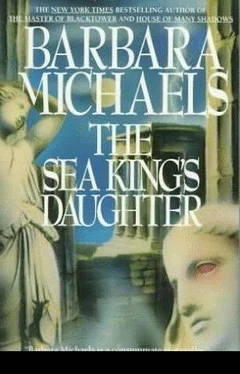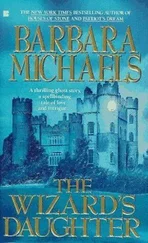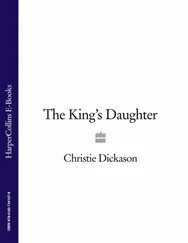Barbara Michaels - The Sea King’s Daughter
Здесь есть возможность читать онлайн «Barbara Michaels - The Sea King’s Daughter» весь текст электронной книги совершенно бесплатно (целиком полную версию без сокращений). В некоторых случаях можно слушать аудио, скачать через торрент в формате fb2 и присутствует краткое содержание. Жанр: Детектив, на английском языке. Описание произведения, (предисловие) а так же отзывы посетителей доступны на портале библиотеки ЛибКат.
- Название:The Sea King’s Daughter
- Автор:
- Жанр:
- Год:неизвестен
- ISBN:нет данных
- Рейтинг книги:3 / 5. Голосов: 1
-
Избранное:Добавить в избранное
- Отзывы:
-
Ваша оценка:
- 60
- 1
- 2
- 3
- 4
- 5
The Sea King’s Daughter: краткое содержание, описание и аннотация
Предлагаем к чтению аннотацию, описание, краткое содержание или предисловие (зависит от того, что написал сам автор книги «The Sea King’s Daughter»). Если вы не нашли необходимую информацию о книге — напишите в комментариях, мы постараемся отыскать её.
The Sea King’s Daughter — читать онлайн бесплатно полную книгу (весь текст) целиком
Ниже представлен текст книги, разбитый по страницам. Система сохранения места последней прочитанной страницы, позволяет с удобством читать онлайн бесплатно книгу «The Sea King’s Daughter», без необходимости каждый раз заново искать на чём Вы остановились. Поставьте закладку, и сможете в любой момент перейти на страницу, на которой закончили чтение.
Интервал:
Закладка:
“Yes. And that isn’t fair either.” She let me go. I sat upright, relieved to see that she was smiling faintly. “I should be amused,” she went on. “This is just the sort of thing your father would do. All these years ignoring our existence, and then, out of the blue, a completely inappropriate gift. I wonder if he remembers how old you are. He certainly doesn’t remember your birth date. But, you see, that’s the sort of man he is. He isn’t interested in living people, and the only dates he can remember are dates before Christ. He didn’t let us go because he disliked us; it was just that he liked-”
“His job more,” I interrupted. The discussion was beginning to bore me. “You told me. He’s a-a archae-”
“Archaeologist. A classical archaeologist. That means that he studies about ancient Greece.”
“And that’s where the statue came from. Are those Greek newspapers?”
“Yes. Presumably he’s in Athens now. I suppose he found this in an antique shop and decided to send it to you. You should be flattered. It’s really a lovely thing. Someday you will be proud to own it.”
“I don’t think it’s lovely. It’s all banged up, and I’ll bet it never was pretty, even when it was new. I’d rather have a new football.” I stood up. “I’m going for a bike ride now, okay?”
“Okay.” She looked up at me, smiling and shaking her head. “Atalanta would have been more appropriate,” she said obscurely. “Heredity is the most mysterious thing. How did that man and I ever breed a female Olympic star?”
That was my first introduction to Ariadne. I didn’t meet her again for years, not until I studied the Greek myths in high school. Nobody knew I was her namesake, and I was careful not to tell them. Privately I thought she was a pretty feeble character. A traitor, in fact. She betrayed her country and her father for her boyfriend, and then he walked off and left her flat. All she could do was sit and cry until some god came along and made her his mistress.
Atalanta wasn’t much better. Imagine letting some man con you out of winning a race by throwing goodies along the way! My personal hunch is that Atalanta wanted to lose. She had outrun a lot of prospective husbands, and being an old maid wasn’t acceptable in those days.
I understood by then, however, why Mother had referred to me as Atalanta, and made that cryptic remark about heredity. Mother is short and getting a little-plump is the word we use. She has no more muscles than an amoeba. She’s bright, though; has her M.A. Now I am not academically inclined, to put it politely. I never had trouble with schoolwork, not after Jim laid down the law: “A B average, or no after-school activities.” But I never did more than I had to do to make that average, and maybe a little extra, just to be on the safe side.
The activities? Track. Swim team. Basketball. Hockey. I tried out for the boys’ baseball team, and caused the biggest flap in the history of Morningside Junior High; that was a few years before the sexist bias in sports made headlines. Jim backed me up. He thought it was funny, since I was taller and better coordinated than most of the boys on the team. But Mother got upset; so I had to let it drop. I wasn’t that crazy about baseball anyway.
In high school I really wanted to try out for the football team. I’m a little light, but I could have played quarterback. Mother burst into tears every time I mentioned the subject, so I gave that up too. I went to practice one afternoon, just to show the coach what he was missing, and completed twenty passes out of twenty-two, with eleven guys doing their best to cripple me and my receivers. They were nice guys; most of them were friends of mine. The center, Randy Sullivan, told me the coach cried after I left. He was probably exaggerating, though.
Jim, my stepfather, is a former All-American.
No, I’m not trying to say that heredity doesn’t count. I’m saying that the question of identity is very complex. What makes you the person you are? How much of you is bred in the bone, de fined in embryo by a bunch of minuscule cells; and how much comes from your environment-friends, parents, physical factors such as diet and freedom from rat bites? Environmental influences aren’t that simple either. Maybe the most important ones are the implicit, unstated assumptions you carry with you, like a heavy knapsack-or like wings. Some of them can drag you down, and some can lift you up, let you fly.
These are old questions. They’ve been argued by biologists and sociologists and psychologists for years. I don’t suppose the answers will ever be definitely settled. But… What if thosearen’t the only things that make a man or woman? What if there are other influences that shape one’s life? Influences that once lived and then died and crumbled into dust-and lived again? Silent inner forces from a past so distant that even the metal of its artifacts has crumbled into dust?
II
I heard from my father, off and on, during the twelve years that followed the arrival of the package. (I thought of him, and spoke of him, when I had to, as “Father.” Jim was always “Dad.”) The communications were just as peculiar as the first one. One was a reprint of a scholarly article he had written, filled with Greek quotations and references to stirrup cups and Late Helladic IIIb. I didn’t even try to read it. The craziest gift of all was an elaborate embroidered, lace-festooned modern Greek costume, complete with coin-trimmed headdress and red boots-for a child about six years old. I was fifteen at the time. Mother laughed till she cried over that…
By the time I went off to college the communications had petered out. There had been no more scholarly articles.
It was pure accident that I learned why. The dentist was running late that morning, and there was nothing to read in the waiting room except issues of Healthy Teeth and an old copy of Saturday Review, or Harper’s, or something of that ilk. I forget which one. I was thumbing through it when the face jumped up out of the page at me.
I didn’t exactly recognize it. I couldn’t have, because I had never seen a picture of my father. If Mother had any, she had never shown them to me. I didn’t know that the man in the photograph was my father until I started reading the article. But even before I saw the name the face was inexplicably familiar.
The article was very amusing if you enjoy the kind of humor that consists of cutting someone else down. The author started out by referring to Professor Frederick’s distinguished past career, and then tore him to pieces. Professor Frederick, it seemed, had gone off the deep end. He believed in the Atlantis myth.
I had heard of Atlantis. It was a wonderful island, a kind of earthly paradise, which sank into the depths of the ocean after being wracked by violent earthquakes and floods. The story is in Plato, than whom there could hardly be a more respectable writer, but scholars used to believe that Plato made up the whole thing. I had a friend, though, who was into mysticism and Rosicrucianism and all that; she thought the Atlanteans had inspired the Egyptians and Mayans and the other early civilizations. According to her and her fellow mystics, there really was an island of Atlantis, and the remains of the palaces and temples are still down there, draped with seaweed, at the bottom of the Atlantic. I had seen some science-fiction movies about it, too.
From the article I learned that the Atlantis theory has become more respectable in recent years. The island couldn’t have been in the Atlantic Ocean, because deep-sea soundings have proved that the ocean floor has been under water for millions of years. But the island that disappeared in a sudden catastrophe could have been somewhere else, and as far back as the late nineteenth century, scholars began to wonder if the basis of Plato’s story might not be found in the Minoan civilization.
Читать дальшеИнтервал:
Закладка:
Похожие книги на «The Sea King’s Daughter»
Представляем Вашему вниманию похожие книги на «The Sea King’s Daughter» списком для выбора. Мы отобрали схожую по названию и смыслу литературу в надежде предоставить читателям больше вариантов отыскать новые, интересные, ещё непрочитанные произведения.
Обсуждение, отзывы о книге «The Sea King’s Daughter» и просто собственные мнения читателей. Оставьте ваши комментарии, напишите, что Вы думаете о произведении, его смысле или главных героях. Укажите что конкретно понравилось, а что нет, и почему Вы так считаете.












